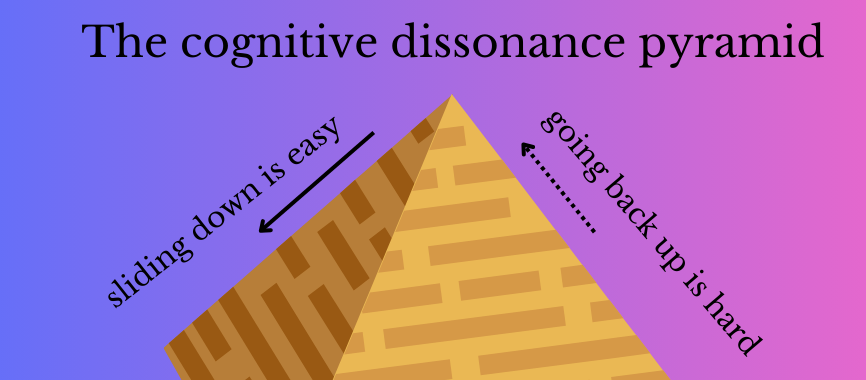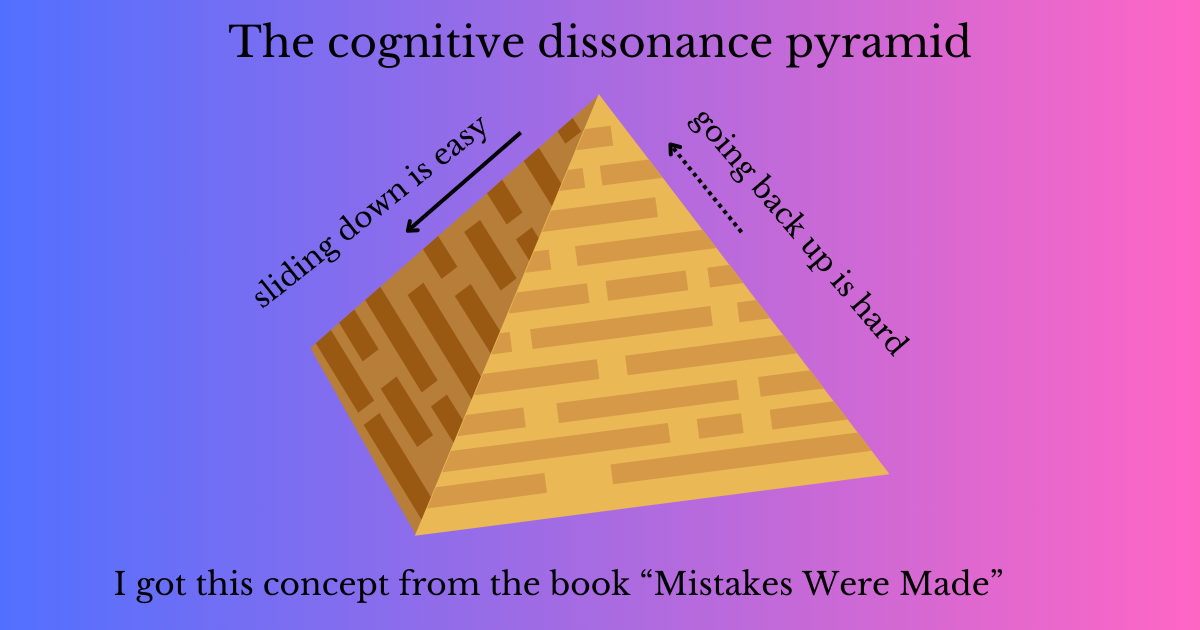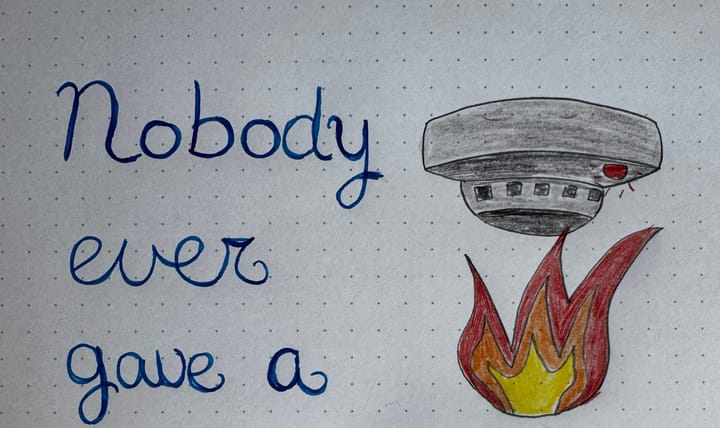The cognitive dissonance pyramid: one hell of a drug.

We are all wrong from time to time, it's part of the human condition. Even smart people can be wrong. True wisdom is being able to admit you were wrong, and then actually change your mind. However, that is very difficult and mentally painful. Many people avoid it all together, and the cognitive dissonance theory explains why. I'll go over the theory with a metaphor I've learned from the book Mistakes Were Made (But Not by Me!), written by Carol Tavris and Elliot Aronson.
Basically, cognitive dissonance is a mental phenomenon that occurs when you're holding two (or more) conflicting thoughts/opinions/behaviors. In the book, it is aptly called: the engine of self-justification.
Here's an extreme example, from the fascinating book When Prophecy Fails. The author, Leon Festinger, infiltrated a group that believed the world would end. This bold prediction was made by Dorothy Martin, a housewife living in Chicago. She said the world would be destroyed by flash floods on December 21, 1954. But she, and other believers, would be saved by aliens in UFO's.
Some of the believers of her theory went all-in. They quit their jobs, stopped their studies, ended relationships, sold their houses....
What happened when the prediction did not come to pass? Some people took the L and changed their beliefs. However, some people actually doubled down on their beliefs and became even more committed! Why???
As described by Leon Festinger in When Prophecy Fails (and also summarized in the book Mistakes Were Made), it all depends on the intensity of the beliefs. The more intense some people believed in the end of the world, the higher their chances were of doubling down in one direction. The people that had gone to extremes in support of the idea that the world would end, had more to lose if they admitted they were wrong. If they admitted to themselves that they had made the wrong choice, they would have to confront the fact that they sold their house for no reason at all! That would make them an idiot, and no one wants to think they are an idiot.
As you can probably tell, there's also a sprinkling of Sunken Cost Fallacy in here, as well.
When Dorothy's prediction did not come to pass on December 21, 1954, she conveniently got a new vision. The world had been spared because their group had faith in God. Right! The most devout believers were extremely happy to hear this news because they had a new excuse for their beliefs. They doubled down in their devotion and started spreading the word even more.
This example is extreme, but I hope it makes clear that cognitive dissonance is one hell of a drug. It truly is an engine of self-justification.
The pyramid
In Mistakes Were Made, they really dropped the ball by not providing an illustration for the excellent metaphor in the book. Allow me to correct that oversight!
This metaphor has helped me understand how cognitive dissonance manifests in myself and in others. Trust me, it's always easier to see it in others and very hard to spot it in your own life.
Cognitive dissonance isn't binary, but more like a scale that we can represent via the metaphor of a pyramid. A pyramid has multiple sides, and the further you slide down one side, the harder it is to see other sides. The sides are of course metaphors for thoughts/opinions/behaviors/beliefs.
Going back up to the top of the pyramid, changing your mind, is very hard. It's way easier to slide down one side and double down on your beliefs.

Let's take myself as an example. It's no secret that I despise the current AI hype and what it does to people's critical thinking abilities. You are either a proponent or a hater, there seems to be very little middle ground. This goes for me as well. I'm firmly at the bottom of one side of the pyramid, I despise all things AI. Tech bros are at the bottom of another side of the pyramid, with a very different belief. They think AI will take over jobs, will fix a lot of problems, will save the human race from...something.

I did not start out on the bottom of the pyramid. How could I? When ChatGPT was released, I was mildly interested. I even paid for ChatGPT pro for a couple of months, to see what the fuss is all about. However, I am a tech skeptic, so I did start out already slightly down the pyramid. In essence, I don't believe tech on its own is ever a solution for anything. Many things that are wrong in the world can be solved without technological innovation, was already my belief.
When I played around with ChatGPT in the context of my nutrition company, I was left feeling disappointed. I used it to generate (social media) text, and it felt soulless. It also got a lot of info about nutrition and health completely wrong, so I was left with the boring work: correcting its many mistakes. I feel a huge responsibility not to spread misinformation regarding nutrition and health, and using ChatGPT felt like a risk. Yes, it was easy to generate a book's worth of content, but a lot of it was fluff, and a lot of it was wrong. I could not feel proud of this work because they weren't my words.
It made me reflect on what I find important in life, and I concluded that I did not want to stop writing from scratch. I don't mind that it takes more time. It's something that I have created and can be proud of. I did feel the allure of the shortcut, don't get me wrong. It's very enticing to just generate a whole book with a simple prompt, but it comes at a cost that I personally could not ignore: skipping the hard work, the thinking, the creating, the things that truly matter! I don't want to automatically write a book, I want to experience the whole process of writing a book, including the painful parts. I would go as far as to say that the painful parts of creating are necessary. It's what defines the human experience. There is no personal growth or learning without these tough moments.

And thus started my slide down the pyramid. Then I learned more things about AI that confirmed my belief. It's bad for the climate, the training data is stolen, it's a censoring machine (source1, source2, source3), it makes us dumber (source1), and it's now also run by fascists (source1, source2). It's all just capitalism on steroids, only benefiting the billionaire class. Sadly, many mediocre white men use these tools because they seem to benefit them. Last week, one of my friends (a white man) said without a trace of irony, "programmers will not exist in 10 years from now". Dear reader, he is a programmer. Is he gleefully helping in the destruction of his own craft? It seems so! He was very positive about AI in the context of programming. AI stuff was "useful to him", therefore it is good. But, in the end, mediocre white men are also just cogs in the machine. Billionaires care about no one, only profit and their nefarious goals.
The lack of systemic thinking that many people display about the impact of these AI tools is worrying me. It's not about you, the individual! Cool that the tool is useful to you, even though it's a mediocrity machine, but by the gods, think BIGGER. Is a tool that is built on theft worth it? Is a tool that censors the mentioning of gender worth it? Doesn't it matter to you that the endgame is an even bigger extraction of knowledge and wealth? That people stop using their brains even more?
As you can tell, it's impossible for me to see my friend's side. When I read articles about positive sides of AI, I feel extremely skeptical. That is, I nearly refuse to believe the benefits.
Cognitive dissonance and the confirmation bias are besties. I am looking for articles that are critical of AI, and will gobble those up. Without a doubt, I am just looking to justify my beliefs about AI. If you are reading this blog as an AI skeptic like me, no doubt you're having a better time reading it than someone who likes using AI. The AI lovers probably dislike me as a person by now.
Apparently, my last post already attracted personal attacks from some men. It happened on LinkedIn and I didn't see them because as soon as the first troll emerges from his mother's basement, I mute the comments.
I hope this post clears up the cognitive dissonance phenomenon for you. I find the pyramid metaphor very striking! It helps me reflect about my own position on things, and I hope you appreciate my honesty about my position in regard to AI. I can still be wrong about it. That's the important part to admit to yourself. You can always be wrong. I hate AI, but I still should be open to positive implementations of it. I can't see them, but that doesn't mean they aren't there.
Let me wrap things up by saying this: I wish you the wisdom to be honest to yourself and others about your beliefs and positions in things. And, if enough information indicates that you are possibly wrong about something, I hope you have the courage to change your mind.
Bonus material
Baldur has a nice metaphor about AI: "I’ve often made the point that generative AI is an amazing tech much like asbestos is an amazing material: they have qualities that feel like genuine miracles but at a human cost so high that broad adoption is only possible if human life is devalued beyond what has been acceptable up until now
But much of the adoption of generative models doesn’t come from the few it does well, but is driven by those who do not understand the job they’re replacing."
Colman inspired the "AI is a mediocrity machine" quote in my post, thanks!!
"LLM generation: for when you aspire to mediocrity."
"how could it be anything else? They're being used to compute most likely extrapolations from an input.
Mediocrity is the best you can hope for, which says a lot about the people who are enthusiastic for them."
Reading tips
The great pretence of software craftsmanship - Bob Marshall
This article resonated with me because I recognize so much bullshit from office jobs in tech in it. Everyone says they care about quality, but no one acts like it.
The coup - Audrey Watters
The roots of computing are deeply militaristic. Computing technology has never not been the tool of the powerful, the oppressor, the imperialist, the cop. This explains to me why so many mediocre white men are fans of tech!



Comments ()